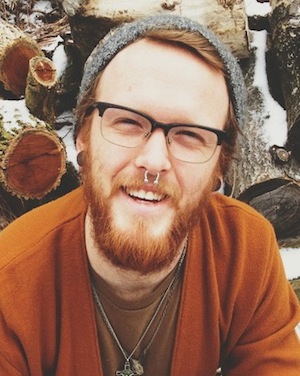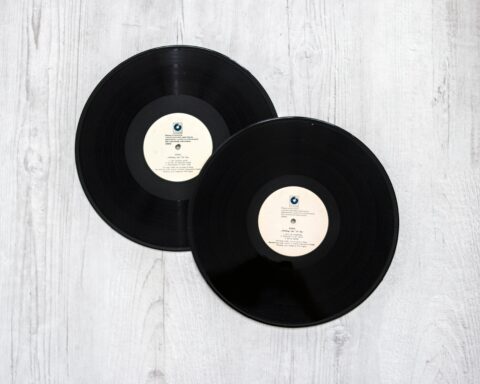
I dropped out of college after a one-semester attempt at art school. This was not just because my soul had something of an allergic reaction to the amount of debt that would come with pursuing that degree, but also because I had this crazy feeling that I was being “called” to move to Pittsburgh and join a punk band called The Last Hope. We hesitated to call ourselves a “Christian band”, because, well, “Christian bands” are for “Christians,” and we saw ourselves as more of a rag-tag traveling troupe trying to love people in the way of Christ. My bandmates and I called this band our ministry, and for the first time, I had felt like I was in the right place. I was participating in the Gospel in my own (albeit perhaps odd-looking) way. I loved to travel, to be on the road, to always be meeting new people. When our band wasn’t touring, I felt choked, like I was just waiting for the chance to breathe again. I felt fulfilled in those long hours pounding our nation’s asphalt, on the stage, or in a dingy basement, playing music that was way too loud.
We carried our religious baggage with us everywhere we went; feelings of judgment and rigidity toward the hypocritical hierarchy of Christendom. We felt much more authentic, much more at home with the honest anger and frustration that we found in the music scene than we did in any church or Christian group. Looking back, I feel like we based a great deal of our identity on what we were not. We were not “those Christians,” we were not our parents’ generation, and we were not sell-outs.
___________________________________________
We felt much more authentic, much more at home with the honest anger and frustration that we found in the music scene than we did in any church or Christian group.
___________________________________________
And yet, we couldn’t deny that we felt separate, too much defined by our “nots.” We longed, I longed, to be part of a more diverse body. After all, how is a a frustrated, tattooed young man going to learn to grow beyond himself in a community made up almost entirely of frustrated, tattooed young people? I wanted to believe there was still hope for “the Church,” despite the horrors and failures of Christendom.

While not on tour, my bandmates and I started participating in a church called Hot Metal Bridge Faith Community in Pittsburgh’s South Side, the neighborhood where we lived and had our home base – In The Blood Tattoo. Hesitatingly, I agreed to participate in our church’s nine-month discipleship class called “the Apprenticeship”: a dedicated book, theology, Bible study, and discussion group. After a little while, I started to notice a shift in myself.This was the first time I started reading for myself, reading because I felt I was being challenged to grow.
Up until this point, I had been fairly satisfied showing up on Sunday for my dose of diversity and then spending the rest of my week with “my people” – the punk rock crew. I felt that if people didn’t look like me, like the same music as I did, they just couldn’t – or wouldn’t – understand me. I had constructed an identity, and I was proud of it! However, the Apprenticeship class made me sit down with other, seemingly “normal-looking” people, and hear about their struggles. Surprisingly, their struggles looked a lot like mine. We shared frustration with “Church” as it is today. As it turns out, it wasn’t just us punk-looking types who had come to this church bearing spiritual burdens. In fact, all of us gathered there were part of a spiritual refugee camp fleeing the battlefield of Christendom.
___________________________________________
As it turns out, it wasn’t just us punk-looking types who had come to this church bearing spiritual burdens. In fact, all of us gathered there were part of a spiritual refugee camp fleeing the battlefield of Christendom.
___________________________________________
Seeds of change were planted during those nine months, and I started to think differently about Church and ministry. Maybe there was more to Church than what I had experienced previously. I started to see Church as something subversive and revolutionary – something that transforms us to be radical about our lives, about our faith, and about loving people. I started reading more and thinking differently about ministry. It couldn’t be this isolated, compartmentalized practice, the church’s brand of a job or career. Ministry had to be a lifestyle, an identity, even. I began to see my band less as a ministry and more as one part of my life, of which I strove to make every aspect ministry. I felt less choked by my need to be on the road, always moving to the next place. Our refugee camp was starting to become a village, and we had to seek ways to live into this new understanding of church and mission. My community in Pittsburgh was becoming a home to me, rather than the place I tried to leave in order to to feel some sense of purpose.

I’ve witnessed this process of cultivation in various aspects of my life, in several intersecting communities. My days playing in the punk band are over, but I treasure that part of my journey because it has brought me to where I am now. Hot Metal Bridge Faith Community welcomed me in – tattered, smelly, and all! – and helped me reconcile myself to God and the Christian community through the vulnerability of allowing my open participation in that community.
There is something powerful about learning to see ministry in every aspect of our lives. Faith comes back to life, the Gospel tells a story that rings true, and the wild goose of the Holy Spirit stirs us to action. This sort of renewal looks different for each one of us, in our own times and places. We just have to be open, flexible, and daring enough to grab that shovel and start digging in the garden in our backyard.
___________________________________________
It can be easy to just keep putting one foot in front of the other and doing the same old thing. How often do we disguise our stubbornness as steadfastness?
___________________________________________
I’ve recently seen this in action through my involvement with the Presbyterian Peace Fellowship. We’re in the process of launching a new initiative encouraging exactly this kind of mission – embracing the gospel call for peacemaking. Our Peace Communities Partnership seeks to highlight these small (but meaningful!) expressions of peace and encourage the ministry of reconciliation that many in the church and beyond are enacting in their villages, towns, neighborhoods, and cities. We’ve just received a flood of applications for the seed grants we’re offering to 7 communities this year. It will be a difficult selection process – an incredibly encouraging reality – because of all the ways people are living out the call of the gospel in their everyday lives. I continue to be reconciled to the church with every story I hear of people participating in Christ-like love and seeking peace in small, new ways. Or maybe it’s in ways so old they just seem new.

My friends will accuse me of being the eternal optimist, but I believe there are clear seasons of struggle in these sorts of things. Our church is entering a season of discernment right now:a time for serious reflection on how to be faithful to wherever God may call us next. It can be easy to just keep putting one foot in front of the other and doing the same old thing because it worked in the past, but I don’t believe that doing so is being honest with ourselves and our call to live out the gospel. How often do we disguise our stubbornness as steadfastness, confusing our methods of mission with mission itself? We must learn to practice mission in new ways, ways that give it life and movement and won’t get us stuck in the same old institutional ruts.
Hot Metal Bridge is 10 years old now, new by comparison, but old enough to start to developing our own ruts. We’ve set patterns and stuck them because they’ve worked, but that doesn’t mean we are free from the need for critical self-examination. Our community demographics have changed as well. Those of us who were spiritual refugees in the beginning are now feel well-planted and comfortable in our church, but through the years, some have moved on and new participants have come. Today we’re more multi-generational – we’ve got families with babies everywhere – we’re not the new, young, hip, punk-rock church we were at the beginning. The Gospel transformed us, and now it’s calling us to be transformed again. There’s a common misconception that being rooted means staying put, but I don’t think it works that way. I believe being rooted in a community means a clear commitment not to stay stagnant but to grow, even when that growth is uncertain and makes us vulnerable.
___________________________________________
There’s a common misconception that being rooted means staying put, but I don’t think it works that way. I believe being rooted in a community means a clear commitment not to stay stagnant but to grow, even when that growth is uncertain and makes us vulnerable.
___________________________________________
 The other day while getting dressed, I found a pair of my old skinny jeans, the kind that really went with my punk-rock fashion statement of my earlier years. As I tried them on, I was convinced I could still fit in them, still make it work. After all, I’m still punk at heart. Sometimes I think it’s that subversive heart in me that helped me recognize the gospel for what it truly is. This radical Gospel has taken me and brought me to some amazing places: some full of excitement and journey, others ripe with struggle and uncertainty. However, if there’s one thing I can be certain of, it’s that we are changed along the way. We are still ourselves, but we are changed, renewed, transformed. As I looked at myself in the mirror after squeezing into my former apparel, I had a realization: I just don’t fit into those skinny jeans anymore.
The other day while getting dressed, I found a pair of my old skinny jeans, the kind that really went with my punk-rock fashion statement of my earlier years. As I tried them on, I was convinced I could still fit in them, still make it work. After all, I’m still punk at heart. Sometimes I think it’s that subversive heart in me that helped me recognize the gospel for what it truly is. This radical Gospel has taken me and brought me to some amazing places: some full of excitement and journey, others ripe with struggle and uncertainty. However, if there’s one thing I can be certain of, it’s that we are changed along the way. We are still ourselves, but we are changed, renewed, transformed. As I looked at myself in the mirror after squeezing into my former apparel, I had a realization: I just don’t fit into those skinny jeans anymore.
AUTHOR BIO: Dylan Rooke serves as Peace Discernment Organizer & National Committee Member of the Presbyterian Peace Fellowship. He is an ordained Presbyterian Ruling Elder and Building Manager at Hot Metal Bridge Faith Community – a union church plant of the Presbyterian and Methodist denominations in Pittsburgh, PA. His passions are communal and simple living; the ecumenical unity of all believers; creating art, music and occasional writing/blogging; non-violent peace activism; hospitality to all; riding his bike everywhere; and learning to fix things. He currently resides as Founder/Caretaker at The Greenway Community House of Hospitality, a Catholic Worker expression in the neighborhood of Hazelwood, Pittsburgh.
Read more articles from the young adult issue.





Unbound Social